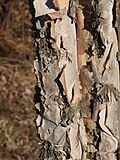The Fagales are an order of flowering plants in the rosid group of dicotyledons, including some of the best-known trees. Well-known members of Fagales include:...
6 KB (381 words) - 18:12, 25 December 2024
Myrica (category Fagales genera)
35–50 species of small trees and shrubs in the family Myricaceae, order Fagales. The genus has a wide distribution, including Africa, Asia, Europe, North...
16 KB (1,413 words) - 13:27, 27 February 2025
arrangement has arisen at least twice independently by convergent evolution, in Fagales and in Salicaceae. Such a convergent evolution raises questions about what...
6 KB (622 words) - 16:32, 9 January 2025
clade Rosids order Vitales clade Fabids order Fabales order Rosales order Fagales order Cucurbitales order Oxalidales order Malpighiales order Celastrales...
16 KB (1,399 words) - 07:57, 6 February 2025
they are not in the same order as the true chestnuts, Castanea in the Fagales. Some are also called white chestnut or red chestnut. In Britain, they...
14 KB (1,246 words) - 14:23, 10 March 2025
Juglandaceae. In the APG system, this family is included in the order Fagales. Several species are known to hybridize, with around nine accepted, named...
22 KB (2,240 words) - 20:58, 5 March 2025
represented: Family: Fabaceae, Family: Polygalaceae, List of Fagales of South Africa – Order: Fagales, Five families are represented: Family: Betulaceae, Family:...
33 KB (2,769 words) - 21:32, 27 October 2024
True nuts are produced, for example, by some plant families of the order Fagales. These include beech (Fagus), chestnut (Castanea), oak (Quercus), stone-oak...
8 KB (786 words) - 23:54, 21 March 2025
as the walnut family. They are trees, or sometimes shrubs, in the order Fagales. Members of this family are native to the Americas, Eurasia, and Southeast...
7 KB (558 words) - 15:51, 25 December 2024
Casuarinaceae are a family of dicotyledonous flowering plants placed in the order Fagales, consisting of four genera and 91 species of trees and shrubs native to...
8 KB (695 words) - 19:50, 2 April 2025
Zygophyllales Celastrales Oxalidales Malpighiales Fabales Rosales Cucurbitales Fagales Malvids Geraniales Myrtales Crossosomatales Picramniales Sapindales Huerteales...
13 KB (1,030 words) - 10:22, 7 February 2025
There are at least 10 members of the birch, alder, and oak order, Fagales found in Montana. Some of these species have been designated as Species of Concern...
2 KB (191 words) - 16:54, 21 March 2022
four urticalean families. The order is a sister to a clade consisting of Fagales and Cucurbitales. Different plants that fall under the order Rosales grow...
12 KB (1,057 words) - 16:07, 9 February 2025
dominated by deciduous trees and evergreen conifers, primarily of the Fagales (beeches, hazels, oaks, walnuts) order, including European beech (Fagus...
17 KB (1,802 words) - 04:34, 30 March 2025
clade consists of four orders of flowering plants: Cucurbitales, Fabales, Fagales and Rosales. This subgroup of the rosids encompasses 28 families of trees...
35 KB (1,375 words) - 02:26, 6 February 2024
throughout the Northern Hemisphere. Betulaceae is included within the order Fagales, which branches from the Rosid clade. The river birch is often found in...
12 KB (1,497 words) - 06:51, 14 January 2025
et al. used only a single calibration point, namely the split between Fagales and Cucurbitales, which was set to 84 Ma, in the late Santonian period...
116 KB (11,067 words) - 23:53, 9 April 2025
Juglandales (category Fagales)
into two families being optional), and the family is placed in the order Fagales. The Standard Cyclopedia of Horticulture: A Discussion for the Amateur...
1 KB (116 words) - 18:25, 25 November 2023
male flowers are borne in the small catkins which are a hallmark of the Fagales order (beeches, chestnuts, oaks, walnuts, hickories, birches, and hornbeams)...
37 KB (3,580 words) - 10:35, 17 March 2025
Cucurbitales de Jussieu ex von Berchtold & Presl 1820 Fagales Engler 1892...
81 KB (6,351 words) - 15:56, 14 April 2025
Myricaceae (category Fagales stubs)
is a small family of dicotyledonous shrubs and small trees in the order Fagales with its type genus Myrica, the sweet gales. There are three genera in...
3 KB (239 words) - 13:27, 6 September 2024
Melchior system (section ordo Fagales)
Melchior in Casuarinales, Juglandales, Balanopales, Leitneriales, Salicales, Fagales, Urticales, Didiereaceae, Piperales, Aristolochiales, Guttiferales, Sarraceniales...
15 KB (896 words) - 21:35, 25 September 2023
2024 in paleobotany (section Fagales)
This paleobotany list records new fossil plant taxa that were to be described during the year 2024, as well as notes other significant paleobotany discoveries...
203 KB (15,416 words) - 03:35, 11 April 2025
with conifers, while the latter occurs mainly with hardwoods of the order Fagales. The sporocarp of L. amethysteo-occidentalis is on average larger than...
14 KB (1,373 words) - 03:04, 10 January 2025
include the grasses, birch trees, along with many other species in the order Fagales, ragweeds, and many sedges. They do not need to attract pollinators and...
105 KB (11,823 words) - 20:31, 4 April 2025
1987 in paleontology (section Fagales)
Wikimedia Commons has media related to 1987 in paleontology. Paleontology or palaeontology is the study of prehistoric life forms on Earth through the...
43 KB (1,548 words) - 18:14, 30 March 2025
Tracheophytes Clade: Angiosperms Clade: Eudicots Clade: Rosids Order: Fagales Family: Fagaceae Genus: Quercus Subgenus: Quercus subg. Quercus Sections...
16 KB (1,482 words) - 09:16, 20 March 2025
Betula medwediewii (category Fagales stubs)
Tracheophytes Clade: Angiosperms Clade: Eudicots Clade: Rosids Order: Fagales Family: Betulaceae Genus: Betula Subgenus: Betula subg. Aspera Species:...
2 KB (133 words) - 21:51, 28 January 2023
Frankia bacteria. They are found in 25 genera in the orders Cucurbitales, Fagales and Rosales, which together with the Fabales form a nitrogen-fixing clade...
49 KB (5,031 words) - 13:32, 15 April 2025
As of July 2016, the International Union for Conservation of Nature (IUCN) listed 238 conservation dependent species. That was 0.29% of all evaluated species...
10 KB (716 words) - 08:05, 15 February 2025























